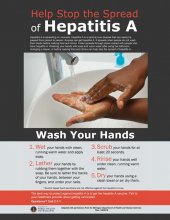
Photo: Louisville Metro Public Health And Wellness
An employee at the Applebee’s restaurant located at 4717 Dixie Highway has been diagnosed with acute hepatitis A. As a result, customers who ate at the restaurant from March 23 to April 12, 2018 may have been exposed to the hepatitis A virus.
Symptoms of hepatitis A are fatigue, decreased appetite, stomach pain, nausea, darkened urine, pale stools and jaundice (yellowing of the skin and eyes). People can become ill 15 to 50 days after being exposed to the virus. Anyone experiencing symptoms should seek medical attention.
Hepatitis A is usually transmitted by putting something in your mouth such as an object, food or drink, which has been in contact with the feces of an infected person. In November, the Kentucky Department for Public Health declared a statewide hepatitis A outbreak. Since the outbreak began there have been 226 cases diagnosed in Louisville and more than 11,000 vaccinated.
“The best ways to prevent hepatitis A infection are to get vaccinated and to practice good handwashing,” said Dr. Lori Caloia, medical director. “Washing your hands thoroughly and often with warm water and soap, especially before preparing meals or eating, after using the bathroom or changing a diaper is a proven way to prevent the spread of diseases. Hand sanitizer is not as effective as hand washing against hepatitis A.”
The Department of Public Health and Wellness recommends anyone working in the hospitality industry, particularly those who serve or prepare food and beverages, protect themselves and others by getting the hepatitis A vaccine. The independent business owners of the Applebee’s restaurants in the state of Kentucky as well as surrounding markets in Illinois, Indiana, Missouri and Tennessee will provide free Hepatitis A vaccinations to their employees.
The department and the University of Louisville Global Health Center have partnered to offer below-cost vaccinations to all hospitality workers. The cost of the hepatitis A vaccine has been reduced from $65 to $25. Businesses with more than 20 employees can have a nurse come to their site to provide the immunizations. Businesses with fewer than 20 employees may designate vaccine for their employees to be immunized at U of L’s walk-in clinic. To arrange these employee immunizations, contact Dr. Ruth Carrico at 502-852-1324.
To date more than 50 local food service establishments have chosen to provide their employees the hepatitis A vaccine through this effort.
For more information about hepatitis A visit https://louisvilleky.gov/government/health-wellness/hepatitis or call 211.
 Employees at two local food service establishments have been diagnosed with hepatitis A:
Employees at two local food service establishments have been diagnosed with hepatitis A:
An employee of the Kroger store at 520 N 35th St. Customers who shopped at the store from March 2-19 may have been exposed to the hepatitis A virus.
An employee of Sarino restaurant at 1030 Goss Ave. Customers who ate at the restaurant from February 24 through March 15 may have been exposed to the hepatitis A virus.
Symptoms of hepatitis A are fatigue, decreased appetite, stomach pain, nausea, darkened urine, pale stools and jaundice (yellowing of the skin and eyes). People can become ill 15 to 50 days after being exposed to the virus. Customers experiencing symptoms should seek medical attention.
Hepatitis A is usually transmitted by putting something in your mouth such as an object, food or drink, which has been in contact with the feces of an infected person. In November, the Kentucky Department for Public Health declared a statewide hepatitis A outbreak. To date there have been 159 cases diagnosed in Louisville.
“The best ways to prevent hepatitis A infection are to get vaccinated and to practice good handwashing,” said Dr. Lori Caloia, medical director. “Washing your hands thoroughly and often with warm water and soap, especially before preparing meals or eating, after using the bathroom or changing a diaper is a proven way to prevent the spread of diseases. Hand sanitizer is not effective against hepatitis A.”
“We are vaccinating employees at both locations to protect them and prevent the further spread of the disease,” added Dr. Caloia. “And Kroger is donating 100 doses of the vaccine to assist with curtailing the outbreak. We encourage other businesses to either donate vaccine or immunize their employees against hepatitis A,” said Dr. Caloia.
“As we approach a very fun and busy spring season in Louisville,” Caloia added, “we are encouraging all food service establishments to be vigilant in emphasizing good hygiene and sanitation practices. We also encourage food service workers to get vaccinated.”
People who wish to get the hepatitis A vaccine should see their doctor or primary care provider. The vaccine is also available at Kroger Little Clinics and pharmacies, as well as Walgreens, Rite Aid and the University of Louisville Pharmacy, 550 S. Jackson St. The hepatitis A vaccination is covered by most insurance plans.
Food service establishments wishing to provide hepatitis A vaccine for their employees can contact Dr. Ruth Carrico at the University of Louisville Global Health Center at 502-852-1324. You can pay for and designate vaccine for your employees at their walk-in clinic, or, if you have 20 or more employees, the clinic nurses can come to your site.

Photo: Louisville Metro Public Health And Wellness
A former employee at the Denny’s restaurant located at 4030 Dutchman’s Lane in St. Matthews has been diagnosed with acute hepatitis A.
The employee worked at the restaurant from February 9-22, 2018. As a result, customers who ate at the restaurant during that time period may be have been exposed to the hepatitis A virus. If they develop symptoms of hepatitis A such as fatigue, low appetite, stomach pain, nausea, and jaundice, (yellowing of the skin and eyes), they should see their healthcare provider. Persons can become ill 2 to 6 weeks after being exposed to the virus.
Hepatitis A is a vaccine-preventable, communicable disease of the liver caused by a virus. It is usually transmitted person-to-person through the fecal-oral route or consumption of contaminated food or water. Antibodies produced in response to hepatitis A infection last for life and protect against reinfection. The best way to prevent hepatitis A infection is to get vaccinated.
Customers who may have been exposed are encouraged to visit www.cdc.gov/hepatitis/hav for more information.
 Weather
Weather Traffic
Traffic @LouisvilleDispatch
@LouisvilleDispatch @LouisvilleDisp
@LouisvilleDisp Subscribe
Subscribe